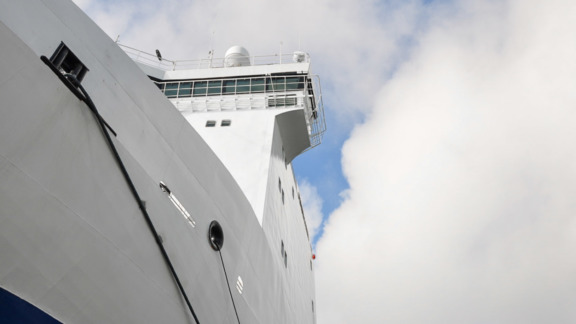Waste service info brought to ships
Cargo ships discharge part of their waste into the Baltic Sea – information on waste services is now brought directly to ships
A significant number of cargo ships in the Baltic Sea discharge part of their waste directly into the sea, completely legally, even though this waste is known to eutrophicate the Baltic Sea. Cargo ships in particular are not aware of the special conditions in the Baltic Sea nor of the No Special Fee payment system at Baltic ports, where a waste fee is charged regardless of whether the ship leaves waste at the port or not. The Baltic Sea Waste Fee Info, initiated by the Baltic Sea Action Group and created in cooperation with the Finnish maritime cluster, provides ships with information on the ease of discharging waste at ports.
“A survey conducted by BSAG and the Shipbrokers’ Association revealed that voluntary actions are needed as soon as possible to reduce eutrophic discharges into the Baltic Sea,” says Elisa Mikkolainen, Baltic Sea Action Group’s maritime Project Director, and continues “BSAG assembled a team to more efficiently disseminate information on the specific conditions of the Baltic Sea and responsible waste management to all the 2000 ships that sail the Baltic Sea each day. With the information package we aim to get all ships to discharge all their waste into port reception facilities and thus reduce discharges from shipping in the Baltic Sea.”
“Traficom wants to participate in raising awareness, especially on ships that visit Finnish ports less often,” says Mirja Ikonen, Head of the Marine Environment team at Traficom and adds “the information package encourages ships to also deliver to port reception facilities the types of waste that can still be legally discharged into the Baltic Sea”.
Sewage causes an unnecessary burden to the Baltic Sea
International regulations define the Baltic Sea as both a special area and a particularly sensitive sea area. The Baltic Sea therefore has special regulations governing shipping, which are stricter than in many other sea areas. However, under certain conditions, vessels may discharge wastewater, treated sewage, and ground food waste into the sea. Waste waters and food waste entering the sea from ships put a strain on the Baltic Sea and exacerbate eutrophication and oxygen deficiency.
Finnish maritime operators co-operate for the benefit of the Baltic Sea
Good cooperation has been a driving force in promoting responsible shipping. The Baltic Sea Waste Fee Info was created by BSAG, the Finnish Port Association, the Shipbrokers Finland, the Finnish Shipowners’ Association, the Finnish Transport and Communications Agency Traficom, the Ministry of the Environment and the Ministry of Transport and Communications of Finland.
“The compact information package contains information on the NSF system, which types of waste are covered by the mandatory waste fee and where a separate fee should be paid. The information package also contains links to port waste management arrangements and information on the special features of marine nature”, says Kirsti Tarnanen-Sariola, Deputy Director of the Finnish Port Association. “The goal of ports is to make it as easy as possible to leave waste in ports. In addition, ships can find the information package on the ports’ websites”, continues Tarnanen-Sariola.
“As a provider of Vessel Traffic Service, we share the information package with ships moving in Finland’s sea areas and international sea areas in the Gulf of Finland. We are very excited to be part of this project,” says Kati Westerlund, Quality & Environment Manager at Fintraffic.
“Finnish shipbrokers and agents deliver the information package to ships and at the same time contribute on their part to reducing discharges into the Baltic Sea. The information package is a great tool for both ships and shipowners”, states Sari Turkkila General Manager at Shipbrokers Finland. In addition, BSAG is marketing the information package through the Responsible Shipping project.
More information:
Elisa Mikkolainen, Project Director, Maritime, Baltic Sea Action Group
+358 40 660 1829, elisa.mikkolainen@bsag.fi
Mirja Ikonen, Head of the Marine Environment team, Traficom
+358 02 95 34 6481, mirja.ikonen@traficom.fi
Kirsti Tarnanen-Sariola, Deputy Director, Finnish Port Association
+358 50 564 6465, kirsti.tarnanen-sariola@satamaliitto.fi

BSAG’s two year Grey waters in maritime traffic -project receives funding from the European Maritime and Fisheries Fund’s Finnish Operational Program 2014–2020.
Read more on Responsible shipping project.



